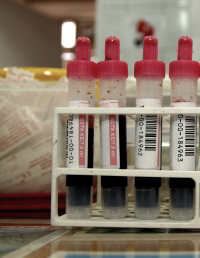Standard Blood Tests for Migraine – are they on the way?
A blood test for migraine? Today there are no standard blood tests for migraine. But is research bringing us closer?
Last month, Northwestern University in the United States announced that they had developed the “First Blood Test to Diagnose Depression in Adults“. The test uses nine RNA (ribonucleic acid) markers in the blood to “see” the difference between a depressed patient and a non-depressed patient.
A couple of years ago, researcher Eva Redei, co-lead author of the study, also developed a test to “see” depression in teens using a blood test. The markers are different in the two age groups.
This same method is being studied in for migraine disease as well.
 |
RNA is closely related to DNA. In fact, both can carry genetic information. To perhaps over-simplify, DNA is like a library of genetic information, which RNA is like a librarian, a messenger that transmits genetic information.
Researchers have used RNA to find genetic information related to migraine, although this approach is not always successful.
A study in 2012 compared 56 adolescents with menstrual-related migraine and non-menstrual-related migraine (Genomic expression patterns in menstrual-related migraine in adolescents.). In this case, there was a significant difference between the two. Although there were commonalities, the “gene expressions” of both were quite different.
Of course in that case, asking questions and keeping a migraine diary would have probably done an even better job of diagnosing than the blood test. So will a blood test ever be useful for migraine patients?
These studies do have a tremendous potential to help us better understand various types of migraine. What is the genetic basis? Are genetic messages being interrupted somehow? Answers to these questions may lead to better treatments for specific types of migraine.
Differentiating between types of migraine and headache disorders may prove to be the biggest bonus of migraine blood tests. If we have enough information to better differentiate, we will be able to get customized treatment to a patient faster.
Although blood tests may not be useful in most individual cases yet, this research has the potential to greatly improve future treatment.
One more interesting note. One of the most successful migraine treatments also has a close relationship with DNA and RNA: Magnesium. Magnesium is involved in the transfer of information from one to the other in a variety of ways. Might this relationship explain why magnesium has helped so many migraine patients?
See also: A Blood Test For Migraine?
